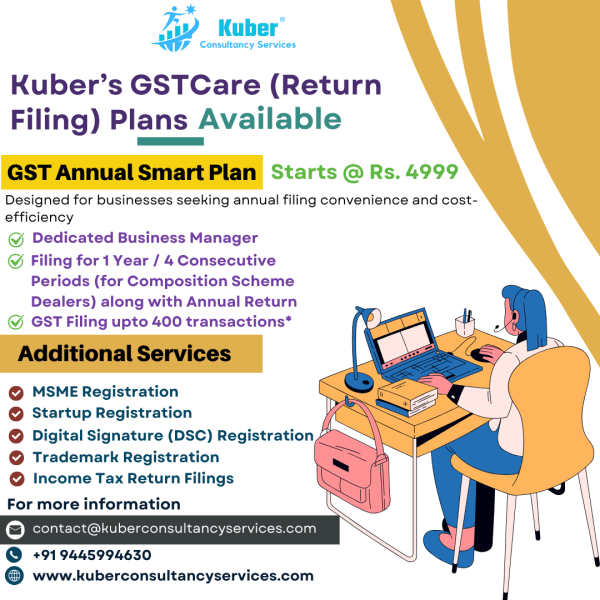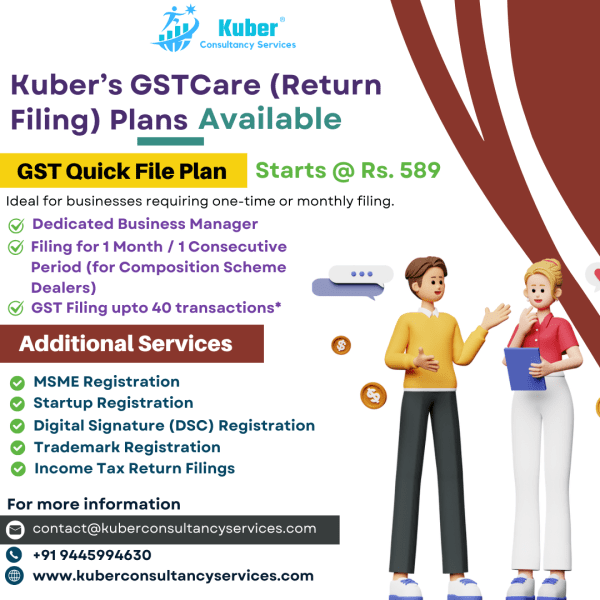Description
Introduction to GST Return Filing Services
GST (Goods and Services Tax) has revolutionized the Indian taxation system, streamlining indirect taxes under a single umbrella. It eliminates the cascading effect of taxes and provides transparency in taxation processes. Every business registered under GST is mandated to file periodic returns to disclose details of their sales, purchases, input tax credit (ITC), and tax liability. These filings form the basis for tax computation and compliance.
GST return filing is a vital compliance requirement. Non-compliance can result in penalties, interest, and even suspension of GST registration. Kuber Consultancy Services offers end-to-end GST Return Filing Services, ensuring your business remains compliant and benefits from efficient tax management. We take pride in simplifying the complexities of GST compliance, providing accurate and timely filings, and assisting businesses in leveraging GST benefits fully.
Our services are tailored to meet the unique requirements of businesses across industries. Whether you are a startup, a small-scale business, or an established enterprise, our expert team ensures that your GST filing process is hassle-free and compliant with the latest GST laws.
| Why Choose Kuber Consultancy Services for GST Returns?
a. Expertise and Accuracy: Our experienced professionals ensure error-free filing with meticulous attention to detail. b. Tailored Services: Customized solutions to meet your business needs, irrespective of size or industry. c. End-to-End Support: From document preparation to final submission, we handle everything seamlessly. d. Real-Time Updates: Stay informed about changes in GST laws and filing requirements. e. Transparent Pricing: No hidden costs; complete transparency in our service charges. f. Process Insights: Explain your step-by-step process in managing GST compliance for clients. |
Advantages of Timely GST Return Submission
Filing GST returns on time offers numerous advantages that extend beyond mere compliance. Let us explore these benefits in detail:
- Avoidance of Penalties and Late Fees: Late filing attracts penalties of INR 50 per day for regular filings and INR 20 per day for nil returns. Over time, these fees can accumulate, significantly impacting your cash flow. Timely filing ensures you avoid such unnecessary expenses.
- Seamless Input Tax Credit (ITC): Input Tax Credit is a crucial feature of GST. It allows businesses to claim credit for the taxes paid on purchases. Timely filing ensures that your ITC claims are processed efficiently, reducing the overall tax burden.
- Enhanced Compliance Rating: The GST compliance rating is an official metric reflecting a taxpayer’s adherence to GST norms. A high compliance rating can enhance your business’s reputation and foster trust among suppliers, customers, and regulatory authorities.
- Better Cash Flow Management: GST filings involve tax payments, and timely filing helps you plan your cash flows effectively. This ensures that your business operates smoothly without financial disruptions due to tax liabilities.
- Reduced Risk of Audits and Notices: Non-compliance or delays in filing often trigger audits and scrutiny by tax authorities. Timely submissions reduce the likelihood of such interventions, saving time and resources.
- Legal Compliance and Business Reputation: Compliance with GST regulations demonstrates professionalism and responsibility, enhancing your business’s credibility in the market.
Essential Documents for GST Return Filing
Proper documentation is the foundation of accurate GST return filing. Here is a detailed list of the documents required:
- Sales and Purchase Invoices: Detailed invoices for all sales transactions, Purchase invoices for input tax credit claims & Bifurcation of inter-state and intra-state sales.
- Debit and Credit Notes: Records of any changes or adjustments in sales or purchases, Debit notes for additional tax liability & Credit notes for adjustments in tax liability.
- Bank Statements: Monthly bank statements for reconciliation of transactions & Details of any tax-related payments made through the bank.
- GSTIN Details: Registered GST Identification Number (GSTIN) & GSTIN of suppliers and recipients for accurate reconciliation.
- E-Way Bills: Details of e-way bills generated for goods transported & Matching e-way bills with sales invoices for compliance.
- Tax Payment Challans: Proof of payment for any taxes deposited & GST challans generated for tax payments during the filing period.
- HSN Summaries: Harmonized System of Nomenclature (HSN) code-wise summary of goods or services & Accurate classification of goods and services for compliance.
- Previous GST Returns: Copies of previously filed GST returns for reference and reconciliation & Ensuring consistency in filing data across periods.
Who Can File GST Returns? – Eligibility Criteria
The eligibility to file GST returns depends on the type of registration and the nature of the business. Below are the categories of taxpayers required to file GST returns:
- Regular Taxpayers: Businesses registered under GST and having taxable outward supplies.
- Threshold Turnover Criteria: Businesses with turnover exceeding the prescribed limit (INR 20 lakh for most states and INR 10 lakh for special category states) & Threshold for services and goods may vary under GST laws.
- Composition Scheme Taxpayers: Taxpayers opting for the composition scheme must file quarterly returns (CMP-08) and an annual return (GSTR-4).
- Input Service Distributors (ISD): ISDs must file GSTR-6 to distribute input tax credit to branches or units.
- E-Commerce Operators: Entities facilitating e-commerce transactions are required to file GSTR-8 to report tax collected at source (TCS).
- Casual and Non-Resident Taxable Persons: Casual and non-resident taxable persons must file GSTR-5 for their transactions.
Checklist for Accurate GST Return Filing
To ensure error-free GST return filing, it is essential to follow a structured checklist:
- Invoice Reconciliation: Match invoices with GSTR-2A and GSTR-2B & Ensure accuracy in invoice details, including GSTIN, tax amount, and HSN codes.
- Tax Liability Computation: Calculate tax liability after adjusting input tax credit & Include tax under the reverse charge mechanism (RCM).
- E-Way Bill Compliance: Verify e-way bill details against sales invoices & Address discrepancies promptly.
- ITC Verification: Check input tax credit eligibility and ensure all claims are valid & Avoid claiming ineligible ITC to prevent penalties.
- Payment of Tax Liability: Ensure all tax dues are paid before filing returns & Generate challans and record payment details accurately.
- Filing of Nil Returns: Even businesses with no transactions must file nil returns to avoid penalties.
Consequences of Late GST Return Filing
- Financial Penalties: INR 50/day for regular returns; INR 20/day for nil returns & Interest at 18% per annum on unpaid tax liability.
- Restricted ITC Claims: Delay impacts ITC availability for suppliers, affecting their compliance as well.
- Legal and Operational Risks: Increased scrutiny from tax authorities & Risk of GST registration suspension.
- Impact on Business Reputation: Poor compliance history may deter potential partners and clients.
| Improving GST Compliance with Better Ratings
a. What is GST Compliance Rating? A metric reflecting adherence to GST laws & High ratings indicate timely and accurate compliance. b. Importance of a High Compliance Rating: Builds trust among stakeholders & Reduces audit risks and legal scrutiny. c. Role of Kuber Consultancy Services: Ensuring timely and accurate filings to maintain high ratings & Regular follow-ups and updates to keep your compliance on track. d. Long-Term Benefits: Discuss how high compliance ratings can lead to better vendor relations and access to government schemes. |
















1 review for Kuber’s GSTCare (Return Filing) Plans